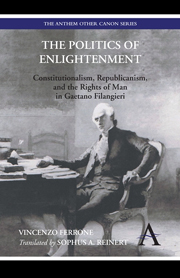 The Politics of Enlightenment
The Politics of Enlightenment Book contents
- Frontmatter
- Contents
- Foreword
- Preface
- Part One The New Politics ‘Ex Parte Civium’
- Chapter One The Enlightenment and the Political Critique of the Scientia Juris
- Chapter Two The Critique of the British Constitutional Model and the Political Laboratory of the American Revolution
- Chapter Three Against Montesquieu and Class Constitutionalism: The Denunciations of the ‘Feudal Monster’ and the ‘Tempered Monarchy’
- Chapter Four Constructing a New Constitutionalism: Masonic Sociability and Equality
- Chapter Five The Neapolitan School of Natural Law and the Historical Origins of the Rights of Man
- Chapter Six Beyond ‘Reason of State’: The Moral and Religious Foundations of the New Politics Ex Parte Civium
- Chapter Seven Nation or Fatherland? The Republican and Constitutional Patriotism of italian Enlightenment Thinkers
- Part Two A Difficult Legacy
- Notes
- Index
Chapter One - The Enlightenment and the Political Critique of the Scientia Juris
from Part One - The New Politics ‘Ex Parte Civium’
Published online by Cambridge University Press: 05 February 2013
- Frontmatter
- Contents
- Foreword
- Preface
- Part One The New Politics ‘Ex Parte Civium’
- Chapter One The Enlightenment and the Political Critique of the Scientia Juris
- Chapter Two The Critique of the British Constitutional Model and the Political Laboratory of the American Revolution
- Chapter Three Against Montesquieu and Class Constitutionalism: The Denunciations of the ‘Feudal Monster’ and the ‘Tempered Monarchy’
- Chapter Four Constructing a New Constitutionalism: Masonic Sociability and Equality
- Chapter Five The Neapolitan School of Natural Law and the Historical Origins of the Rights of Man
- Chapter Six Beyond ‘Reason of State’: The Moral and Religious Foundations of the New Politics Ex Parte Civium
- Chapter Seven Nation or Fatherland? The Republican and Constitutional Patriotism of italian Enlightenment Thinkers
- Part Two A Difficult Legacy
- Notes
- Index
Summary
A law student at the outset of his studies ought first to know the derivation of the word jus. Its derivation is from justitia. For, in terms of Celsus’ elegant definition, the law is the art of goodness and fairness. 1. Of that art we [jurists] are deservedly called priests.
Digest, I, 1, IWhy did discussions concerning the right to punish, rather than reflections on different forms of government, imbue and mark large parts of the political debate of the Italian Enlightenment, characterizing it so profoundly in relation to other European milieus? For what reason, for example, did the most original aspects of eighteenth-century discourse on political philosophy – first of all with regards to meditations upon justice and the formulation of a new science of legislation rather than the detailed analysis of governmental institutions or the nature of power – emerge in a historical context like that of the Kingdom of Naples? What lay behind the sudden attention paid by Neapolitan thinkers to the ancient theme of the Diceosina and the concept of a just and fair society? We know that the myth of the noble savage, the primitivist utopias of hypothetical states of nature, and of perfect republics never enjoyed great success in Italy. The homeland of Dante and of Machiavelli, of the most refined humanism and of the most ruthless political realism, did not entertain itself with daydreaming when it came to making headway in the art of government.
- Type
- Chapter
- Information
- The Politics of EnlightenmentConstitutionalism, Republicanism, and the Rights of Man in Gaetano Filangieri, pp. 2 - 12Publisher: Anthem PressPrint publication year: 2012


